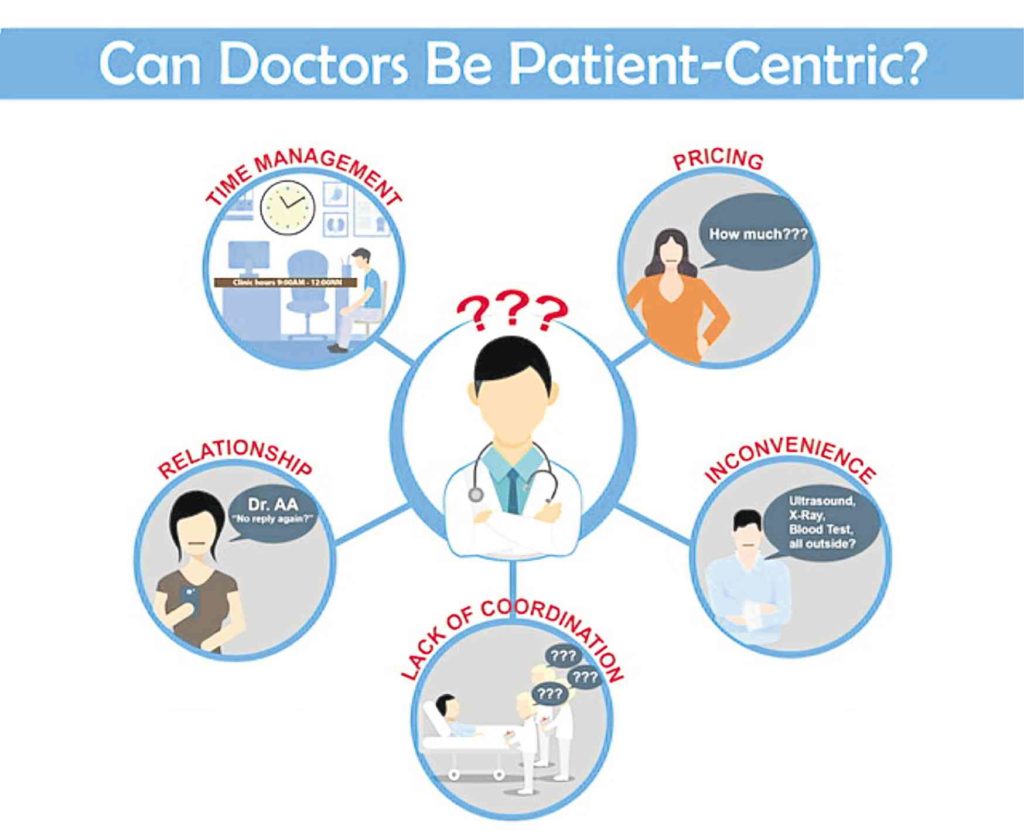Does your doctor really care about you?
Medical doctors play an important role in one’s health and wellbeing. Yet, people who are not feeling well still postpone a visit to the person who can actually heal them.
Gary de Ocampo, chief executive of Kantar Philippines, says 40 percent self-medicate, while 50 percent simply endure the sickness (tiis, in Filipino parlance) hoping it will go away on its own. He adds: “Doctor consultations remain at a maximum of 20 percent.”
How can doctors encourage more patients to visit? Below are general complaints against doctors. Beyond the criticism, it’s for doctors to be more aware that patients’ expectations extend beyond health issues. After all, the allied experience is as important as the core service of healing. Even hospitals have confirmed their desire for their doctors to be more patient-centric with various slogans centering on “patients first” and similar themes.
a. Time management: Doctors can sometimes be late for their promised clinic hours, unmindful that the physical pain of their patients is sometimes extended to emotional pain. Doctors can be insensitive and make their patients wait. Second is the long queue when visiting, affecting the schedule of working individuals. Lastly, doctors only talk to patients for a short time during consultation hours.
b. Pricing: The topic is usually a guessing game for first time patients as nothing related to professional fees is posted anywhere in the clinic. Second, some doctors would charge a higher initial visit fee, unmindful of the pledge they made to their professions. Third, some doctors accredited by health maintenance organizations (HMOs) try to charge extra to make up for the much lower “wholesale” professional fee paid to them by these firms, waiving it only when card-carrying patients protest.
Article continues after this advertisementIn this digital age, patients have ample access to information online before visiting the doctor’s clinic. Sometimes, the waiting time at the clinic encourages patients to search on their smartphones about the pain they are feeling. It would be sad if doctors tell them exactly what they have already read online, making patients wonder about the relevance and value of needing a doctor. After all, the patients were made to wait in line to pay for information they think they already know.
Article continues after this advertisementc. Relationship: Doctors sometimes don’t have rapport-building skills. Because of lack of empathy, patients are even blamed for their diseases.
There’s also a loss of trust when doctors exploit a patient’s visit by trying to sell food supplements. Then there is also the lack of a follow-through or caring attitude, not even a simple telephone or text message, to check if patients are fully complying with doctor’s orders.
Surprisingly, even unfriendly receptionists may discourage some patients from returning to the same doctor or clinic. This is especially highlighted in clinics with long queues where receptionists insist all patients to simply wait and stand outside the doctor’s clinic, ignoring suggestions to just text patients when their turn is near.
d. Inconvenience: Some doctors insist that blood tests be done in another hospital, not where they hold clinic. Second, there’s a hassle associated with passing on medical records from one doctor to another. Third, multiple medicines prescribed are not thoroughly explained, leaving patients to research them on their own.
e. Lack of coordination: For patients admitted, different doctors repetitively ask different medicines they have been taking instead of reading a list already written on the hospital registry form. Another example, one doctor would not allow water to be consumed before a procedure while another would require medicines to be taken which necessitate hydration.
One of the most interesting business models in the health industry is that of Minute Clinic, which is already part of the CVS drugstore chain in the United States. They are open daily (including Sundays) with average queuing time of just 15 minutes. Prices, displayed prominently, are also much cheaper compared to those of other hospitals and clinics. Minute clinics are also manned by nurse practitioners, or registered nurses with advanced training. And while it is part of the CVS drugstore chain, interestingly, it doesn’t provide prescriptions.
Another topic of debate is the tendency of Western-trained doctors to hold clinics for sick patients instead of instilling in them a mindset for preventive healthcare. Note that medical doctors do not practice charging monthly retainer fees like what lawyers and consultants do, only when patients go for visits. It is possible the issues are interrelated, thus medical doctors continue to practice their profession the way the previous generations have been doing.
Perhaps, it is time for doctors to evaluate and redirect their practices, challenging themselves to be more innovative in their doctor-patient relationship model.—CONTRIBUTED
